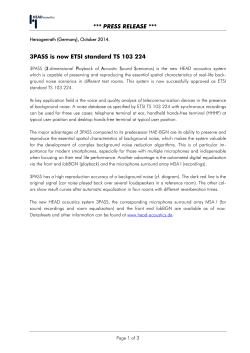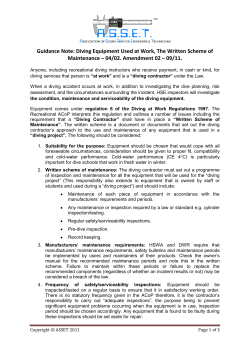
SIO133 Week 8 Study Guide 1. Lecture 19: Diving Physiology
SIO133 Week 8 Study Guide 1. Lecture 19: Diving Physiology & Osmoregulation 2. Lecture 20: Health 3. Lecture 21: Odontocete Acoustics & Biosonar -----------------------------------------------------------------------------Announcements: Term Paper Due: June 1 via Turnitin.com Final Exam Review: June 2, 5-7pm: Cognitive Science Building room 004 Interesting Link: Voices in the Sea http://cetus.ucsd.edu/voicesinthesea_org/ -explore diversity of marine mammal vocalizations -----------------------------------------------------------------------------Lecture 19: Diving Physiology & Osmoregulation Diving 1. List three reasons to explain marine mammals dive? 2. What are some of the challenges of deep diving associated with oxygen availability? Increased pressure? Other challenges? 3. What are some adaptations for deep diving that were likely driven by the challenges listed in questions 1 and 2? Osmoregulation 1. What is osmoregulation? 2. What are input and excretion routes for salts in the body? 3. How does prey choice influence osmoregulatory requirements of marine mammals? How does this relate to kidney size? To length of loops of Henle? 4. Describe the difference between preformed water and metabolic water. Lecture 20: Health 1. Different stressors can cause cumulative effects to impair health. What are some of these stressors that either cause death or weaken the animal to make it susceptible to other causes of death? List and describe four. Lecture 21: Odontocete Acoustics & Biosonar 1. What purposes do the following sounds serve for odontocetes? 2. What does the frequency of echolocation clicks tell you about the range at which an organism can detect a target? 3. How does sound travel to create echolocation? Put the following terms in order: cochlea -- prey item -- Monkey lips -- acoustic window in mandible -- melon 4. How many pairs of “monkey lips” do odontocetes have? What might this enable? Figure 1: Sperm whale "Monkey Lips" 5. The study of acoustics is a rapidly growing field for the study that can provide data on the foraging behavior of marine mammals. List 3 other aspects of marine mammal science that can be directly studied with acoustics.
© Copyright 2025

















